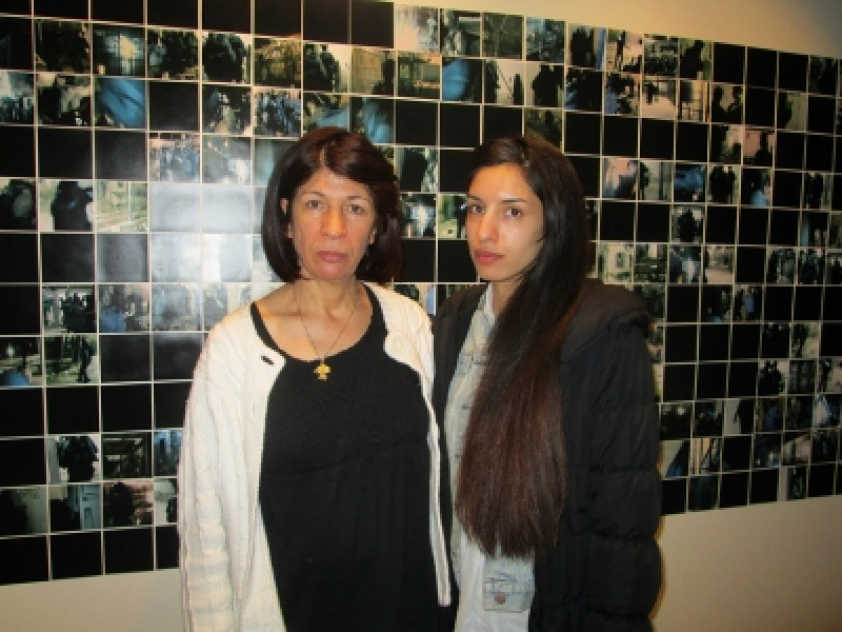 Rehab Nazzal with her daughter Rana Nazzal in front of photos of a raid on Palestinian prisoners. Smiling didn't seem appropriate given the context.
Rehab Nazzal with her daughter Rana Nazzal in front of photos of a raid on Palestinian prisoners. Smiling didn't seem appropriate given the context.
May
Rehab Nazzal recently returned to Ottawa to install her latest multimedia exhibition Invisible at the Karsh-Masson Gallery as part of the City of Ottawa's Public Art Program. She left Ottawa a few years ago to pursue her Masters of Fine Arts at Ryerson University in Documentary Media and is now pursuing a PhD in Fine Arts at the University of Western Ontario.
Born in a small town near Jenin in North Palestine, Nazzal's family earned a living from their orange orchards and olive groves, which they used in the local market and for export to the Arab countries. But in 1967, her life changed dramatically with the Israeli military occupation. Palestinians since have suffered a military rule that locked them up in the West Bank and the Gaza Strip. Economic hardship, restrictions of movments and the “terror” of military occupation have marked Nazzal's life, like that of many other Palestinians. After leaving the West Bank for university, Nazzal was denied the right to return to her country. Before immigrating to Canada in 1995, Nazzal lived and worked with Palestinian refugees and prisoners' families developing education and health programs for women and children.
“Like any other immigrant we had to learn English, adjust with the weather in Canada” she shared. Nazzal and her young family settled in Ottawa. Like so many newcomers, Nazzal could not find a job in her field so instead she decided to turn her passion, art, into a profession. She had been painting and drawing since her youth, but she decided to learn and explore contemporary art. She studied video and photography in the University of Ottawa's Fine Arts Program. Nazzal thinks that video and photography are more objective mediums for the artistic expression especially of political subjects.
The focus of Nazzal's art is the struggle of the Palestinian people for freedom. “Any art that speaks of the artist's own experience has a high degree of honesty. And my work is about my experience, our experience” she explained. When she returned to the West Bank in 2004 she recorded the experiences of her family and other Palestinian civilians. In 2006, during a visit with her family, Nazzal recorded “A Night at Home”, a short video filmed in the dark. Viewers of this video would listen to the sounds of a night invasion by Israeli military forces. Nazzal believes that her work is about sharing common human experiences of fear and suffering as well as resilience and resistance.
“Military violence is the disaster that is disguised by what we called modernity,” Nazzal stated. Reflecting on 20thCentury atrocities from the First World War, the Holocaust, The Palestinian Nakba, the Rwandan Genocide, Vietnam War, the Afghanistan War, and the Iraqi War among many other disasters, Nazzal wonders if we have a right to say we are progressing as a civilization. “During the First World War, it is said that only 10% of those who died were civilians. Before that Great War, armies would get out of civilian areas to fight. The Second World War was a disaster; over 50 per cent of the victims were civilians! And now, most of the people dying and suffering are civilians!” she stated passionately. The topic of her current research is the impact of the new war technologies such as Drone Warfare on civilians.
Despite focusing on rather disheartening subject matter as an activist and artist, Nazzal remains hopeful. She feels that the fact her work resonates with such a diversity of people is positive. “A Night at Home” has garnered her letters and e-mails from others who have experienced military violence from the Former Yugoslavia to Latin America. “It always strikes me how diverse people, from across our world, relate to that night at home that my children and I encountered in a small town in Palestine. That's what is great about art,” she stated.
Her latest video and photography installation Invisible, focuses on the invisible conditions of Palestinian political prisoners. Invisible will run from May 9thto June 22ndat the Karsh-Masson Gallery, Ottawa City Hall, and 110 Laurier Avenue West. There will be an Artist Talk with Nazzal on June 1st, at 2:00 PM.
To learn more about Rehab Nazzal visit http://www.rehabnazzal.com/
To learn more about Invisible in Ottawa visit http://ottawa.ca/en/residents/arts-culture-and-community/arts-theatre-music/rehab-nazzal
To read an interview with Rehab Nazzal about an earlier exhibit Walking under Occupation from The Ottawa Citizen in 2008 click here.
This is the first installment in a series of profiles of Palestinians in Canada Muslim Link is writing in honour of the United Nations' Year of Solidarity with the Palestinian People (IYSPP).
This article was produced exclusively for Muslim Link and should not be copied without prior permission from the site. For permission, please write to info@muslimlink.ca.
















